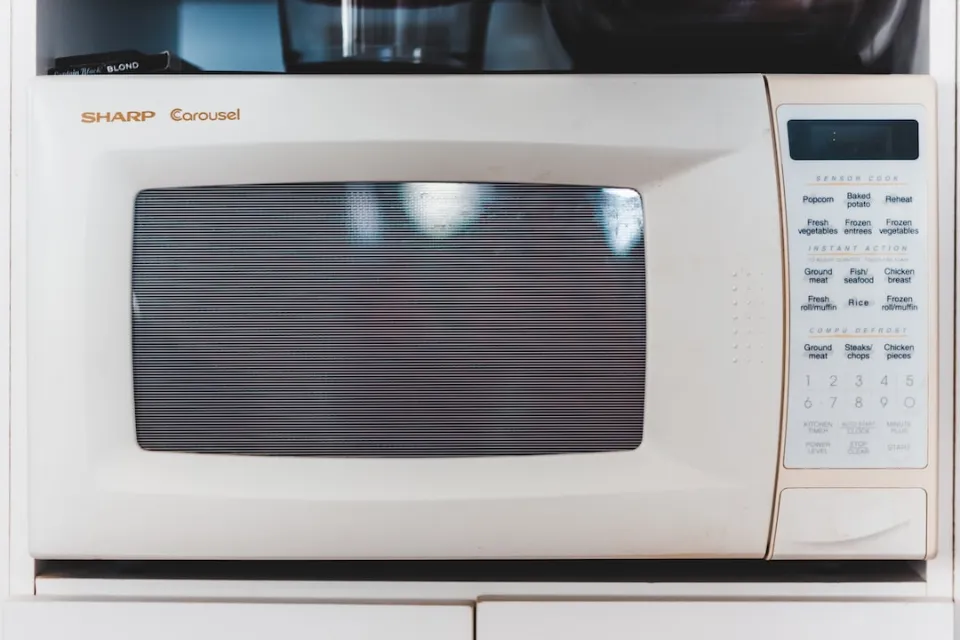One of the most widely used appliances in homes all over the world is the microwave. In America, 90% of households have a microwave, according to statistics.
But how long do microwaves last? How do you know when it’s time to replace your microwave?
A microwave has a 9 to 10 year lifespan on average. However, this number will differ based on the brand, model, and how often it is used.
Answers to these queries and details on microwave lifespan are provided in this blog post.
To ensure you get the most use possible out of your appliance, we’ll also offer some advice on how to prolong the life of your microwave. So keep reading!
How Long Do Microwaves Last

The Average Lifespan of Microwaves
Microwaves typically have a decent lifespan in terms of appliances. However, they eventually reach the end of their useful life and must be replaced, just like everything else.
Also Read: How Does A Microwave Oven Work – Complete Guide to Use It in 2023
Most microwaves need to be replaced after only nine to ten years of use. That’s not to say that all microwaves only last 10 years, but it’s definitely the average.
Of course, this can vary depending on the brand, model, and how often it’s used.
For example, a high-end microwave that’s used infrequently may last up to 15 years, while a lower-end model that’s used daily may only last 5 years.
So, while the average lifespan of a microwave is 9 years, yours could last anywhere from 5-10 years or more. You might even get up to 15 years out of it if you take good care of it and don’t use it excessively.
Overloading a microwave or heating greasy or oily food are two examples of how to reduce its lifespan.
Your microwave should last you a very long time if you take good care of it and use it properly.
10 years is the average, but there are always outliers. Some microwaves last much longer, while others only last a few years. It all depends on how you handle and maintain your microwave.
So, if your microwave is getting on in years, you shouldn’t worry too much. Probably all that’s needed is an upgrade. And who knows, your old model may not have had some features that the new one does!
Read More:
- Can You Put Aluminum Foil in the Microwave – Is It Safe to Use
- Is Melamine Safe for the Microwave – How About Melamine Dishwasher
- Is Pyrex Safe In The Microwave – What to Pay Attention
- Can You Put Chinese Food Containers In The Microwave?
- Can you Microwave Plastic Tupperware – Solved 2023
- Can You Put Paper Plates in the Microwave – Is It Safe to Use?
Factors Affect the Lifespan of Microwaves
A microwave’s lifespan can be impacted by a variety of elements, including the unit’s quality and usage frequency. However, most microwaves can last decades with the right maintenance.
There are several factors that can affect the lifespan of a microwave, such as:
The Quality of the Unit
You typically get what you pay for when it comes to appliances. It is crucial to spend money on a high-quality microwave because of this.
Cheap, poorly made units are more likely to break down and need to be replaced sooner. A well-built, durable microwave will be worth the extra money in the long run.
How Often It’s Used
How often you use your microwave also plays a role in how long it lasts
Naturally, a microwave that is used frequently will last less time than one that is only occasionally used.
That’s because more frequent use puts more wear and tear on the appliance. If you want your microwave to last, try to use it only when necessary.
The Type of Use
Every microwave has its own set of applications. Compared to, say, cooking a Thanksgiving turkey, heating up a cup of coffee or a frozen meal is significantly less taxing on the appliance.
Look for a microwave that is made to handle heavy-duty use if you intend to use it for that purpose.
Care and Maintenance
The lifespan of your microwave also depends on how well you take care of it. It will last longer if you keep it clean and don’t overuse it than if you let it accumulate dirt and never clean it.
If it isn’t taken care of properly, even the most expensive, best-built microwave won’t last very long. Make sure to regularly clean the appliance inside and out.
Additionally, avoid attempting to fix anything that breaks on your own. To handle any repairs, contact a professional.
So, if you want your microwave to last as long as possible, invest in a high-end model from a trusted manufacturer and treat it well.
Additionally, if you use it frequently, think about purchasing two so you can alternate them and give each one a break.
A microwave has a 10-year lifespan on average, but there are a number of factors that can change this.
The brand, model, usage, and care all play a role in how long do microwaves lasts. So, if you want yours to last as long as possible, keep these factors in mind.
6 Signs It’s Time to Replace Your Microwave
Your microwave wasn’t made to last forever, like all kitchen appliances. It will eventually require replacement. Here are the telltale signs that it’s time to start looking for a new microwave, the only question is when.
1. Smoke, Sparks, and Burning Smells.
These are indicators of a critical and pressing issue. Stop what you’re doing right away, and unplug and turn off the microwave. If you spot smoke, sparks, or the burning smell, there is no turning back. It’s time to get a new microwave because yours is breaking down.
2. Food Isn’t Cooking Properly.
The fact that microwaves significantly shorten cooking times is one of their appeals. If your microwave is heating food much slower than normal, or not at all, something is off.
Test your microwave if you believe its power is beginning to fade. Using high power for two minutes, boil one cup of water. Consider getting a new microwave if it’s not scorching hot.
3. It Makes Horrible Sounds as It Cooks.
Your microwave should operate quietly while cooking, producing no more than a soft hum. The opposite is true if it starts to make loud noises like grinding, buzzing, or rattling. Start by inspecting the fan and turntable. It’s simple to correct a food leftover or alignment issue. If those areas are examined and found to be in good condition, there may be a larger issue that can best be solved by purchasing a new microwave.
4. the Door Doesn’t Seal Properly.
The microwave door must be completely sealed when closed. This crucial safety measure is intended to contain radiation. This alone is reason enough to get a new microwave if it appears cracked, severely worn, or broken.
5. The Keypad Doesn’t Function
Microwave cooking is impossible without the keypad. When you enter the cook time, power setting, or start button, it should respond. If not, things might be getting worse. The keypad might only require a thorough cleaning. But if that doesn’t work, it might be time for a replacement.
6. It’s over 10 Years Old.
The majority of microwaves have a 10-year lifespan. However, even if yours is older than ten years and seems to be in good condition, it might be time to upgrade because technology advances and most appliances become much more energy efficient.

Tips to Lengthen a Microwave’s Lifespan
Here are some tips to help you get the most out of your microwave and keep it running for as long as possible.
Use It Regularly
Utilizing your microwave frequently is one of the best ways to maintain its effectiveness.
This assists in avoiding the accumulation of dirt and grime, which may lead to the microwave overheating and eventually breaking down.
If you only use your microwave occasionally, it’s a good idea to give it a good clean every few months to keep it in top condition.
Avoid Overheating
Microwaves can overheat if they’re used too often or for too long at a time. In addition to shortening the appliance’s lifespan, this could harm its internal parts.
It’s best to stop using your microwave and give it some time to cool down if you see that it’s starting to overheat.
Don’t Use It for Everything
Although they are excellent for reheating food and beverages, microwaves are not made for cooking from scratch.
Using your microwave to cook food can cause it to overheat and break down prematurely.
It is best to spend money on a microwave-safe cooking bag or container if you intend to cook food in your microwave.
Keep It Clean
One of the best ways to keep your microwave running efficiently is to keep it clean. The interior surfaces of a microwave can collect dirt and grime, which can lead to an increase in temperature and eventual breakdown of the appliance.
Regularly cleaning both the inside and outside of your microwave is crucial. Clean the interior surfaces with a damp cloth or sponge, and wash the exterior surfaces with a mild detergent.
Be Careful With What You Put in It
Being cautious with what you put in microwaves is important because some materials can harm them.
Avoid using metal containers, as they can cause sparks that can damage the microwave. If you’re reheating food in a plastic container, make sure that it’s microwave-safe.
Don’t Overdo It
Its lifespan may be shortened if your microwave is used excessively. It’s best to buy a second appliance if you discover that you’re using it several times per day.
This will help to prolong the lifespan of your microwave and keep it running efficiently for many years to come.
By following these tips, you can help to prolong the life of your microwave. Just remember to use it safely and carefully, and you’ll be able to enjoy its convenience for years to come.
Repair Or Replace: When is It the Right Choice for You?
If your microwave is starting to show its age, you may be wondering if it’s time to repair or replace it.
When deciding whether to repair or replace your microwave, there are a few factors to take into account. These factors include how much it will cost to fix the issue, how serious it is, and how old the appliance is.
Here are a few things to consider when making your decision:
1. The Cost of Repairs
It’s likely time to start looking for a new microwave if the cost of repairs is more than half that of one.
2. the Severity of the Problem
It is best to replace your microwave if the issue is serious and involves sparks or smoke coming from the appliance.
3. the Age of the Microwave
As was already mentioned, microwaves typically last 10 to 12 years. If yours is about to expire, you might want to look into getting a new one.
If you’re still not sure whether to repair or replace your microwave, it’s best to call a professional for help.
They’ll be able to identify the issue and make recommendations for the best course of action.
Microwave Repair Cost

Depending on how serious the issue is, repairing a microwave can cost different amounts. For instance, replacing a fuse instead of the entire appliance is a much more affordable repair.
Here are some average costs of common microwave repairs:
| Replacing a fuse | $10-$20 |
| Replacing the door | $50-$100 |
| Replacing the heating element | $30-$60 |
| Replacing the power supply | $40-$80 |
Calling a professional for assistance is recommended if you’re having any issues with your microwave.
Microwave Replace Cost
The cost of replacing a microwave can vary depending on the size and features of the new appliance. For example, a basic microwave will cost less than a high-end model with all the bells and whistles.
Here are some average costs of common microwaves:
| Basic microwave | $50-$100 |
| High-end microwave | $500-$1,000 |
If you’re in the market for a new microwave, it’s best to compare prices and features before making your purchase.
How to Dispose of An Old Microwave Safely
When your microwave begins to malfunction, it might be time to start planning how to safely dispose of it.
If you’re not sure what to do with your old appliance, here are a few tips on how to get rid of a microwave oven:
- Ask the recycling facility in your area. Microwaves can be recycled at a lot of places. This is frequently the simplest and greenest method of getting rid of an old microwave.
- Donate your microwave to a nearby charity or secondhand shop. Your appliance might be useful to someone else if it’s still in good working order.
- Online or at a garage sale, offer your microwave for sale. If your appliance is still in good shape, this is an alternative.
- Call the waste removal company in your area. You might be able to have your microwave picked up as part of your regular trash service in some circumstances.
- Take your microwave to a landfill or dump. Since microwaves can occupy valuable landfill space, this should only be used as a last resort.
Be sure to abide by all local laws and ordinances when getting rid of a microwave. This will aid in ensuring that your outdated appliance is discarded legally and safely.
It’s critical to properly dispose of your old microwave if you’ve decided to replace it. If microwaves are not properly disposed of, dangerous chemicals they contain could leak into the environment.
Summary
In many people’s lives, microwaves play a significant role. They provide a quick and easy way to cook food.
Microwaves do, however, have a lifespan that is limited, just like all other appliances. To prepare for when a microwave needs to be replaced, it’s critical to understand how long they last.
FAQs
When Should You Replace Your Microwave?
There is no definitive answer to this question, as the lifespan of a microwave depends on a number of factors, including how often it is used, what type of foods are cooked in it, and whether or not it is properly maintained.
However, most experts agree that microwaves should be replaced every five to seven years. If your microwave is starting to show signs of wear and tear, or if it is no longer cooking food evenly, it may be time to invest in a new one.
Do Microwaves Last Forever?
Yes, microwaves have a limited lifespan. How frequently a microwave is used, what kinds of foods are cooked in it, and whether or not it is properly maintained are just a few of the variables that affect how long it will last.
How Long Do Commercial Microwaves Last?
A commercial microwave has a 6 to 10 year lifespan on average. However, this range can differ based on the brand, model, and frequency of use.
A high-end commercial microwave, for instance, could last up to 15 years, whereas a lower-end model might only last 5 years.
How Long Do Over-the-range Microwaves Last?
A microwave over the range has an 8 to 10 year lifespan on average. However, depending on the brand, model, and amount of use, this range may vary.
An expensive over-the-range microwave, for instance, could last up to 15 years while a less expensive model might only last 5 years.
How Long Do Built-in Microwaves Last?
The average lifespan of a built-in microwave is about 9 to 11 years. However, this range can differ based on the brand, model, and frequency of use.
With proper care and maintenance, your microwave can last for many years.
How Long Does a Microwave Magnetron Last?
The component of the microwave that generates the microwaves that heat your food is called a magnetron. A magnetron can last anywhere between two and six years on average.
However, this range can differ based on the brand, model, and frequency of use.
How Long Does a Microwave Turntable Last?
A microwave turntable typically lasts between five and seven years. The brand, model, and frequency of use, however, can affect this range.
Is It Worth Fixing a Microwave?
It depends. If your microwave is fairly new and the repair is not too expensive, it may be worth fixing.
You might be better off purchasing a new microwave, though, if your old one needs a lot of work.
Should I Replace My 20-year-old Microwave?
Your 20-year-old microwave should be replaced, yes. Your microwave has likely reached the end of its useful life because a microwave’s lifespan is typically between 6 and 10 years.
Can a Damaged Microwave Harm You?
Radiation harm can be emitted from a broken microwave. Burns, cancer, and other health issues may develop as a result of radiation exposure.








